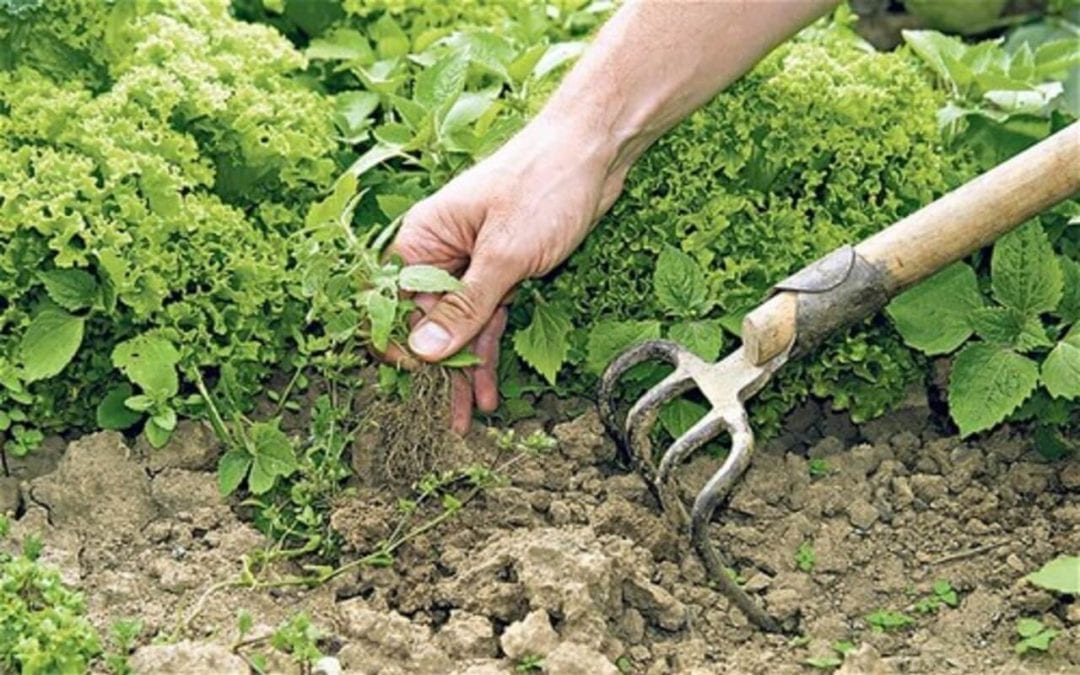In the 70s and 80s, organic control of garden weeds and diseases was something practiced by hippies and health nuts. After all, DuPont’s advertising slogan was Better Things for Better Living Through Chemistry until 1982. If you had a gardening problem, there was a spray that would eliminate it.
A lot has changed since then. Every grocery store has a section of organic food. Farmers’ markets are more popular than ever. And many gardeners are growing their own, and want to do so with as little chemical interference as possible. I think that organic gardening has moved beyond being labeled as a fad.
Wanting our food, yards and homes to be safe is why we get lots of questions about treating plant diseases and infestations without harming ourselves and the world around us. It’s a way of taking control of what we eat, making our homes secure and respecting the environment.
So let’s begin with the first pest of the season-weeds. There is lots of data that supports leaving early weeds like dandelions and violets to bloom for pollinating insects. But who wants ground ivy taking over the perennial bed? Unfortunately for the gardener who is trying to avoid using chemicals, there haven’t been any magic spray weed killers for lawns and gardens. Most herbicides on the market, as well as home remedies, will kill the weeds above ground, but leave the roots unfazed and perfectly able to re-sprout. Organic weed control is more about management of your lawn and garden. Robust landscapes tend to have fewer weeds. The theory? Healthy lawns, gardens and soils promote vigorous plant growth that can out-compete weeds. The practice? Aerate your lawn. Mulch your garden. Water smartly. And when you plant, add compost.
There is a promising herbicide on the market introduced by the folks at Dr. Earth. Final Stop is formulated with a unique combination of 7 essential oils that, combined, work together to kill weeds from leaves to roots. It’s important to remember that this product is a non-selective herbicide and will affect any plant it comes into contact with. Please follow package instructions and apply on a calm day to avoid drift.
After weed control, our most-asked questions at the Plant Desk are about diseases, with fungal issues ranking number 1 through 5. Warmer winters result in more fungal spores surviving into spring. And warmer summer temperatures mean more humidity. For the last several years, these factors have combined to create a perfect storm for fungal diseases like mildews, blights and leaf spots. Old school fungicides are very effective, but can be harmful to beneficial insects and are not useful for edibles.
Serenade, from Bayer Advanced, is made from a patented strain of Bacillus subtilis. This beneficial bacteria penetrates and destroys the disease pathogen, but does not harm insects or wildlife. In fact, you can harvest and eat fruits and veg the same day they are treated. As with any treatment, follow package instructions regarding the amount used and how often it should be applied. More is not better, and only wastes the product.
My purpose is not to lay a guilt trip on any gardener. Everyone’s threshold for what’s acceptable in their landscape is different. Errant weeds are more than inconvenient in parts of my rocky and gravely Japan-esque garden. In those places, I might break out the big guns. But where I can, I’d much rather use an effective pea-shooter.


